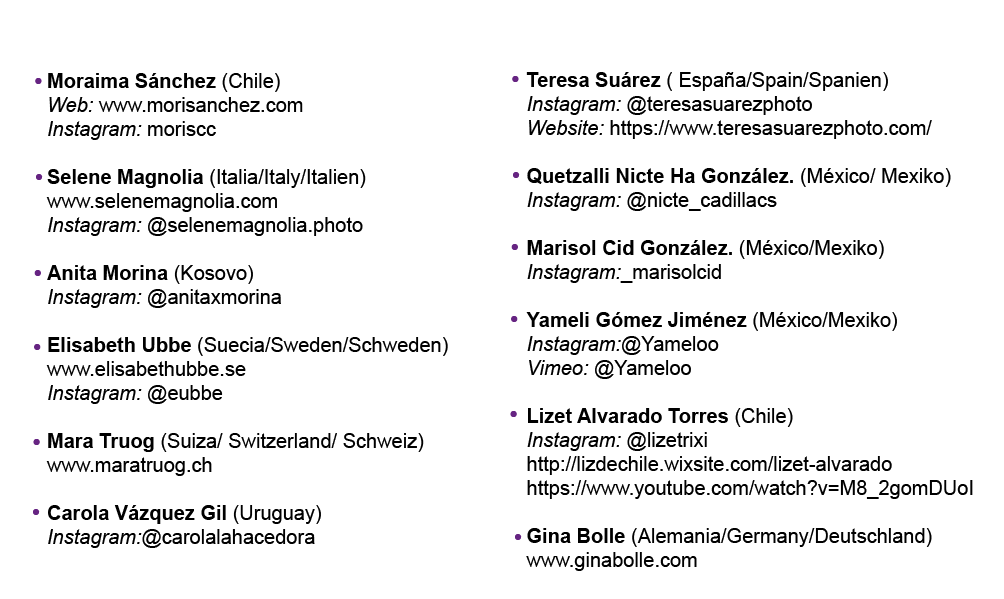//SINOPSIS//
¿Por qué protestan las mujeres?, ¿ cuáles son sus reivindicaciones? y ¿qué se ha consegido hasta ahora?
La organización del evento surgió entre planes que teníamos lxs integrantes de Latinxs Leipzig para participar en la protesta del 8 de marzo de 2020 y hacer eventos de acuerdo a ese tema. La pregunta era: ¿ qué queremos hacer?, ¿por qué queremos participar?.
Al principio quería mostrar (Yameli) fotos del 8 de marzo en México de los últimos dos años pero no le encontraba sentido, sólo quería representar una nostalgia que sentía por no estar este año allá; así que entre leyendo y viendo qué era lo que pasaba en nuestros propios países y compartiendo experiencias con mis compas del colectivo, decidimos enfocarnos primero en Latinoamérica y luego en todo el mundo.
Al principio pensábamos hacer la convocatoria entre nuestrxs amigxs por el tiempo que teníamos, hasta que lo comenté con mis compas de la maestría y todo se salió de control...( pero en el buen sentido)
Después de 24 horas nos llegaron emails con material de Kosovo, Sudán, Turquía, India y Marruecos. Con eso nuestro plan/objetivo había llegado más lejos de lo que habíamos pensado.
Con esta exposición mostramos que existen problemas similares y desigualdad de género en todo el mundo, en unos más,en otros menos,pero el patriarcado ahí está. Sabemos que falta mucho por hacer pero al mismo tiempo, lo que nos motiva es que existen iniciativas creadas por mujerxs en diferentes partes, que luchan por vencer estereotipos y acabar con todo lo que nos hace daño. Estas imágenes y proyectos deben de ser vistos, ¿por qué? porque esta lucha es de todxs y no nos van a parar.
La exposición muestra diferentes perspectivas, no sólo sobre protestas feministas, sino también aborda proyectos hechos por mujeres en diferentes partes del mundo, como El Salvador, Honduras, México, Colombia, Chile, Argentina, Sudán, Perú, Uruguay, EEUU., Francia, Suecia, Kosovo, Suiza e Italia.
//ZUSAMMENFASSUNG//
Warum protestieren die Frauen, was sind ihre Anliegen und was haben sie bis jetzt geschafft?
Die Organisation der Veranstaltung ergab sich aus den Plänen, dass die Mitglieder von Latinxs Leipzig am Protest vom 8. März 2020 teilnehmen und Veranstaltungen zu diesem Thema durchführen sollten. Die Frage war: Was wollen wir tun? Warum wollen wir teilnehmen?
Am Anfang wollte ich (Yameli) Fotos vom 8. März in Mexiko der letzten zwei Jahre zeigen, aber ich sah keinen Sinn darin. Ich wollte nur eine Nostalgie darstellen, die ich fühlte, weil ich dieses Jahr nicht da war. Zwischen dem Lesen und Sehen, was in unseren eigenen Ländern geschah, und dem Erfahrungsaustausch mit meinen Freunden aus der Kollektive beschlossen wir, uns zuerst auf Lateinamerika und dann auf die ganze Welt zu konzentrieren.
Am Anfang dachten wir, wir sollten für die Zeit, die wir hatten, zwischen unseren Freunden telefonieren, bis ich es mit meinen Kommiliton*innen der Master erwähnte und alles ging außer Kontrolle geriet ... (aber auf eine gute Art)
Nach 24 Stunden erhielten wir E-Mails mit Material aus dem Kosovo, dem Sudan, der Türkei, Indien und Marokko. Damit war unser Plan / Ziel weiter gegangen, als wir gedacht hatten.
Mit dieser Ausstellung zeigen wir, dass es weltweit ähnliche Probleme und Ungleichheiten zwischen den Geschlechtern gibt, in einigen mehr, in anderen weniger, aber das Patriarchat ist da. Wir wissen, dass noch viel zu tun ist, aber gleichzeitig motiviert uns, dass es Initiativen von Frauen* in verschiedenen Teilen gibt, die kämpfen, um Stereotypen zu überwinden und alles zu beenden, was uns weh tut. Diese Bilder und Projekte müssen gesehen werden, warum? Weil dieser Kampf für alle ist und sie uns nicht aufhalten werden.
Die Ausstellung zeigt verschiedene Perspektiven, nicht nur über Proteste, sondern auch über Projekte von Frauen aus verschiedenen Ländern, wie El Salvador, Honduras, Mexiko, Kolumbien, Chile, Argentinien, Sudan, Peru, Uruguay, USA, Frankreich, Schweden, Kosovo, Schweiz und Italien.
//SYNOPSIS//
// PARTICIPANTAS//PARTICIPANTS//TEILNEHMERINNEN//
Why do women protest? What are their demands? What have they achieved until now?
The members of Latinxs Leipzig wanted to organize several actions and events for March 8th. And we asked ourselves: What do we want to organize? Why do we want to participate in this event?
At the beginning, I (Yameli) wanted to exhibit photographs of the last two demonstrations of March 8th in Mexico, but somehow I could find the purpose of it. It was like representing my nostalgia for not being home this year. So I kept looking for meaning in the experience of other countries and sharing my experiences with friends of our collective. The idea of the exhibition convinced us all. At the beginning we wanted to focus on Latinamerica, so we started a Call among our friends from latinamerica, and then I shared the call with some friends of my Masterstudies... and everything went out of control (in a very good sense)
After 24 hours we received Photographs not only from Latinamerica but from Kosovo, Sudan, Turkey, India and Morocco. So our plan got further than we expected.
With this exhibition we show that similar problems and gender inequality exists all around the world. In different ways, patriarchy takes place. We know that there is still a lot to fight for, but at the same time, to realize that women all around the globe organize and start empowering projects to achieve their emancipation and fight against gender stereotypes, brings us lots of motivation.
These images and projects must gain visibility, why? Because this fight is for all of us! And no one will stop us!
The exhibition shows different perspectives, not only of feminist protests, but also projects started and developed by women from all around the world, like: El Salvador, Honduras, Mexico, Colombia, Chile, Argentina, Sudan, Peru, Uruguay, USA, France, Sweden, Kosovo, Switzerland and Italy.


// PARTICIPANTAS//PARTICIPANTS//TEILNEHMERINNEN//
"Grupo de mujeres caminan por calle Alameda." Santiago, Chile. (8/03/2019)
Por/By/Von Alejandra Fontecilla Saieh
"Performance un violador en tu camino."
Santiago, Chile. 29/12/2019
Por/By/Von Claudia Pool
#8M
Paysandú, Uruguay, 2019.
Por/By/Von Carolina Vázquez Gil
< Atrás/Züruck
"Legal Abortion Protest"
Lima,Peru 2019.
Por/By/Von Astrid Soldevilla
"An Angry March For better Birth Care"
Stockholm, Sweden 2017.
Por/By/Von Elisabeth Ubbe.
"Enough"
It says “Is it enough already? (we don’t mind going out on the streets but...)
Priština, Kosovo (2019)
Por/By/Von Anita Morina.
Astrid Soldevilla
“Deshojar orquídeas”
Peru, 2018.
Lilly Winter
“Calm before the storm”
Washington, USA 2016.
“El acuerdo es vivir.”
Tatiana Vila Torres
Chiapas, México. 2018.
“Volveré y seré millones.”
Tatiana Vila Torres
Honduras. 2016.
// PARTICIPANTAS//PARTICIPANTS//TEILNEHMERINNEN//
"I will stay until the end"
Elisabeth Ubbe.
Suecia/Sweden/Schweden.
"The Mass (2017)"
Por /By/Von Anita Morina.
Kosovo
"Sin pueblos indígenas no hay constitución"
Por/By/Von Moraima Sánchez.
Santiago de Chile 2019.
Área de Género de la Comisión Organizadora del Día Nacional de los/las Afroargentinos(as) y la cultura Afro.
Buenos Aires, Argentina.
"Heroes"
Por/By/Von Anita Morina.
Kosovo.
"Feminists in resistance"
Por/By/Von Gina Bolle.
Calcutta, India. December 11th 2019
14 de febrero 2020. /14.02.2020
Por/By/Von Quetzalli Nicte Ha González.
CDMX, México/ Mexiko Stadt.
"Ritorno al Medievo"
Selene Magnolia
Italia/Italy/Italien
2018
8M
Carola Vázqueu Gil
Paysandu, Uruguay.
2019
“Feminists against Polanski”
Teresa Suárez.
París, Francia/ Paris, Frankreich.
2020
Abajo/Down/Unten:
Arriba/Up/Oben: